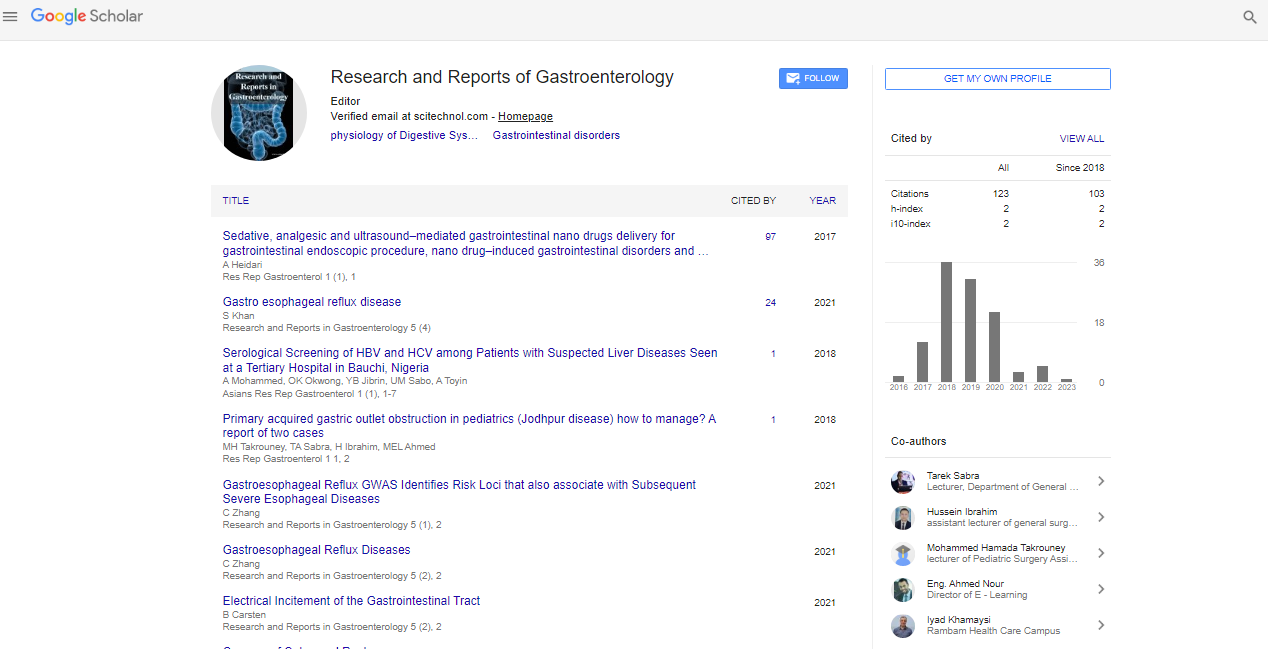Commentary, Res Rep Gastroenterol Vol: 7 Issue: 4
The Hormonal Conductors: Exploring Gastrointestinal Hormones and their Crucial Roles
Marie Jensen*
1Department of Medicine, Aalborg University, Aalborg, Denmark
*Corresponding Author: Marie Jensen,
Department of Medicine, Aalborg
University, Aalborg, Denmark
E-mail: jensenmarie@gmail.com
Received date: 20 November, 2023 Manuscript No. RRG-24-124074;
Editor assigned date: 22 November, 2023, PreQC No. RRG-24-124074 (PQ);
Reviewed date: 06 December, 2023, QC No. RRG-24-124074;
Revised date: 13 December, 2023, Manuscript No. RRG-24-124074 (R);
Published date: 20 December, 2023, DOI: 10.4172/Rrg.1000161
Citation: Jensen M (2023) The Hormonal Conductors: Exploring Gastrointestinal Hormones and their Crucial Roles. Res Rep Gastroenterol 7:4.
Description
The digestive system is a marvel of coordination, with various organs working in harmony to break down food, absorb nutrients, and maintain overall gut health. Central to this intricate symphony are gastrointestinal hormones, signaling molecules that regulate digestive processes and contribute to the complex interplay between the gut and the rest of the body.
Gastrointestinal hormones
Produced by G cells in the stomach lining, gastrin plays a central role in stimulating the production of gastric acid. When food enters the stomach, gastrin is released, triggering the secretion of acid to aid in digestion. Excessive gastrin production can contribute to conditions like Zollinger-Ellison syndrome, characterized by the overproduction of gastric acid. CCK is released by cells in the small intestine in response to the presence of fats and proteins. Its primary functions include stimulating the release of digestive enzymes from the pancreas and promoting the contraction of the gallbladder to release bile. CCK is instrumental in optimizing the digestion and absorption of nutrients, particularly lipids.
Secretin is released from the duodenal lining in response to acidic chyme entering the small intestine. Its main role is to stimulate the pancreas to release bicarbonate, which helps neutralize the acidic contents arriving from the stomach. By maintaining a more neutral pH, secretin supports optimal conditions for enzymatic digestion in the small intestine.
Gastric Inhibitory Peptide (GIP) is released by the small intestine in response to the ingestion of carbohydrates and fats. It acts to inhibit gastric acid secretion and plays a role in regulating insulin release from the pancreas, contributing to the control of blood sugar levels.
Motilin is released by cells in the small intestine between meals and during fasting periods. It stimulates the contraction of the muscles in the stomach and small intestine, promoting the movement of chyme through the digestive tract. Motilin helps maintain the migrating motor complex, a cyclical pattern of contractions that occurs between meals and during fasting.
Produced by various cells in the digestive system, including the stomach, pancreas, and small intestine, somatostatin has inhibitory effects on the release of several hormones, including gastrin and insulin. It helps regulate the overall digestive process by modulating the activity of other hormones.
Functions and regulation
The release and regulation of gastrointestinal hormones are finely tuned processes that respond to specific stimuli in the digestive system. Factors such as the type of ingested food, the pH of the chyme, and the presence of various digestive enzymes influence the secretion of these hormones. The goal is to ensure that each stage of digestion is orchestrated in a coordinated manner, optimizing nutrient absorption and utilization.
These hormones act not only locally within the digestive organs but also have systemic effects. For example, incretins like GIP and glucagon-Like Peptide-1 (GLP-1) released in response to nutrient ingestion play a vital role in glucose homeostasis by influencing insulin release from the pancreas.
Imbalances in the production or response to gastrointestinal hormones can have clinical implications and contribute to digestive disorders. For instance, disorders like gastrinoma can result in excessive gastrin production, leading to increased gastric acid secretion and the development of peptic ulcers. Malfunctions in hormone release or action can also contribute to conditions like Irritable Bowel Syndrome (IBS) or Inflammatory Bowel Disease (IBD), impacting the motility and overall function of the gastrointestinal tract.
Understanding the roles of gastrointestinal hormones has led to the development of targeted therapeutic interventions. Medications that mimic or block the action of specific hormones are utilized to manage conditions such as diabetes, where incretin-based therapies aim to enhance insulin release in response to meals. Additionally, drugs targeting acid secretion, such as proton pump inhibitors, modulate the effects of gastrin and play a crucial role in managing acid-related disorders.
Gastrointestinal hormones are the conductors of the digestive symphony, orchestrating the intricate processes that allow our bodies to extract nutrients from the food we consume. The delicate balance maintained by these hormones ensures optimal digestion, absorption, and overall gut health. As our understanding of these signaling molecules deepens, so does the potential for targeted therapies and interventions to address a myriad of digestive disorders, offering hope for improved management and outcomes in the area of gastrointestinal health.
 Spanish
Spanish  Chinese
Chinese  Russian
Russian  German
German  French
French  Japanese
Japanese  Portuguese
Portuguese  Hindi
Hindi 